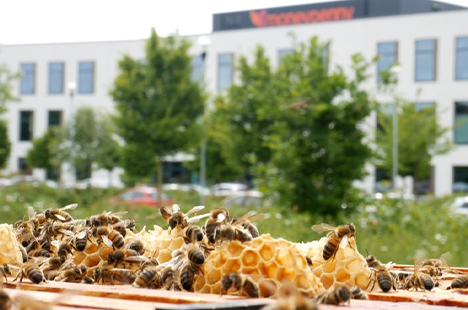
Despite what the title implies, being a chief finance officer today often means taking on responsibilities that may not traditionally call for a numbers person. One such responsibility is fostering a strong company culture.
There is a growing awareness of the importance of a positive workplace among finance executives. Over half (58%) of CFOs in the technology sector view organisational culture as a top priority for human capital investment in 2025, according to a survey from Grant Thornton, an accounting company. That is up from 45% the previous year. As businesses across the country face rising costs, using pay to attract the best and brightest simply isn’t enough to tackle ongoing skills shortages. In short, culture has become the new currency.
If not already, culture should be a key area of focus for finance executives, stresses Karla Smith, chief financial officer at Ogilvy UK, the advertising agency. ”The CFO is at the forefront of conversations and decisions that dramatically impact people,” she says. “We have control over budgets and a powerful voice in the business and boardroom. It’s not just the role of HR to create an inclusive and supportive environment – CFOs have a responsibility to contribute fully to this.”
But culture is exceedingly tricky to get right. Good vibes are easy to sense but much harder to measure. Here, three CFOs share how they are championing culture in their own unique way.
Becoming a mental health ally
Stress, anxiety and burnout are on the rise in the workplace. The number of people experiencing mental health issues at work doubled between 2013 and 2023, according to analysis from The Health Foundation, a think-tank.
At Ogilvy, Smith has set out to do something about it. She is trained as a mental health ally and is a trustee and treasurer of a charity called NABS, which supports the wellbeing of those working in the advertising and media sector. “It’s an amazing organisation that supports people both financially and emotionally and seeks to champion wellbeing through initiatives, training and campaigning,” Smith says.
The CFO is at the forefront of decisions that dramatically impact people
Smith has led a range of projects at Ogilvy to foster a culture where people feel heard, supported and safe. The firm recently integrated wellness into its manager training, designed to equip leaders with the tools and understanding to manage mental health more effectively in their teams. She adds: “This came about because we noticed middle managers were struggling to separate their roles as managers and mental health allies.”
People are encouraged to take a restorative break from their daily work, with the option to take part in weekly workshops aimed at reducing stress and anxiety, including breathing and meditation classes and yoga sessions.
One of the more unconventional initiatives at Ogilvy was starting a monthly finance meeting with a sound bath: a meditative experience where you are bathed in sound waves. “We were much nicer to each other afterwards,” Smith says. “I think it fuelled more positive conversations.”
As CFO, Smith advocates and supports any new initiatives staff suggest within the company, not just by allocating budgets but by making sure people have time and space to spend on them and a champion for the initiatives they roll out. “We launched an Ogilvy choir in 2024,” she says. “There is a certain power of singing together. I think it’s a massive boost to mental health. Plus, the choir can sing at the Christmas party – and that saves money so it’s a win-win.”
Hard work isn’t the point of the office
The right office space has the power to counter negative workplace culture and instead foster an environment where employees can thrive. So says Tom Moran, the CFO at Komi Group, a digital media company. With previous experience in property management, he led the refurbishment of Komi’s Manchester office, going to great lengths to make the space look and feel homey.
“The converted mill is a nod to the apartment of someone in their twenties,” he says. “Our thinking was that to get people into the office to collaborate, the office needed to feel like the comfort of the home.”
It has a kitchen stocked with snacks and a ‘living room’ where staff can watch Netflix. There are also quiet zones so people can work undisturbed if they wish. “We want everyone to feel confident that, no matter how they’re feeling, there is a way for them to work in the office,” Moran explains.
As CFO, I believe financial decisions should align with cultural values
His approach to productivity is considerably more relaxed than one might expect from a CFO. “I don’t think there’s a correct way of working. During the pandemic, people worked on the couch. There’s no point trying to force everyone to work at a desk all day.”
The next big challenge now for Moran – and for every CFO – is creating a more inclusive and transparent approach to finance. A long-lasting challenge for finance teams is feeling siloed from the rest of the organisation. To break down barriers, Moran decided to integrate members of the finance team into other departments. “Rather than sitting on their own in a corner, my finance team is fully embedded across different teams,” he says. “This means they are fully invested in what is happening across the business.”
Since making this change, Moran has observed a difference in how the finance team is perceived by others. “Finance generally have a reputation for being quite unapproachable. But this new way of working has broken down silos and built trust. The finance team is able to be more supportive across the business, which has, in turn, boosted employee confidence.”
Giving back to the community
Investing in company culture does not always have to be an expensive endeavour. There are simple ways to foster an environment where people feel valued and empowered, says Andrew Collis, CFO at Moneypenny, a customer-call answering service.
His approach is to give employees the power and ownership to drive their own vision of company culture. To do this, Collis launched the Moneypenny Business Council, a team of employees who have their own budget to make changes in the business. This covers everything from choosing the charities that the company supports to launching events. Recent projects include a World Book Day book-wrapping fundraiser and a family Easter egg hunt.

“Giving people the tools and freedom to lead initiatives and take risks creates lasting impact and seeing our people take ownership and bring new ideas to life has been incredibly rewarding,” he says. “As CFO, I believe financial decisions should align with cultural values, ensuring that doing the right thing benefits our people, our clients, the environment, the wider community and, ultimately, the business.”
Collis is passionate about nature and sustainability. He spearheaded a month of ESG activities at Moneypenny, which included a net-zero masterclass and a planet-awareness day, which he hosted. Collis was also behind the introduction of two beehives full of native British honeybees being installed at Moneypenny’s office in Wrexham to support biodiversity.
His philosophy is that company culture should convey a meaningful sense of purpose. For example, Moneypenny’s summer activities scheme gives people free access to sports and leisure equipment such as paddle boards, picnic sets and blankets, rounders game kits and tennis rackets.
“I’ve been proud to play a key role in helping to drive initiatives that make a real difference to the local community,” Collis says. “We are renowned locally for our legendary company parties, handing out hams and turkeys at Christmas to all our people and arranging our special company Christmas markets. When leadership is actively involved in culture, it leads to happy people and stronger engagement, better decision-making, and a more successful business overall.”
5 ways CFOs can crack culture
Keeping an open dialogue with people is not only the right thing to do but also fosters trust and innovation.
Giving people the tools and freedom to lead initiatives and take risks creates lasting impact.
Stand in people’s shoes, be present and get actively involved – this helps to reinforce company values and is a great way to get to know your people.
Making culture a priority in all decision-making strengthens both the team and the company’s success.
Meaningful change comes from continuously thinking outside the box and looking for better ways to do things and support people which, in turn, creates a positive workplace.

Despite what the title implies, being a chief finance officer today often means taking on responsibilities that may not traditionally call for a numbers person. One such responsibility is fostering a strong company culture.
There is a growing awareness of the importance of a positive workplace among finance executives. Over half (58%) of CFOs in the technology sector view organisational culture as a top priority for human capital investment in 2025, according to a survey from Grant Thornton, an accounting company. That is up from 45% the previous year. As businesses across the country face rising costs, using pay to attract the best and brightest simply isn’t enough to tackle ongoing skills shortages. In short, culture has become the new currency.
If not already, culture should be a key area of focus for finance executives, stresses Karla Smith, chief financial officer at Ogilvy UK, the advertising agency. ”The CFO is at the forefront of conversations and decisions that dramatically impact people,” she says. “We have control over budgets and a powerful voice in the business and boardroom. It's not just the role of HR to create an inclusive and supportive environment – CFOs have a responsibility to contribute fully to this.”





